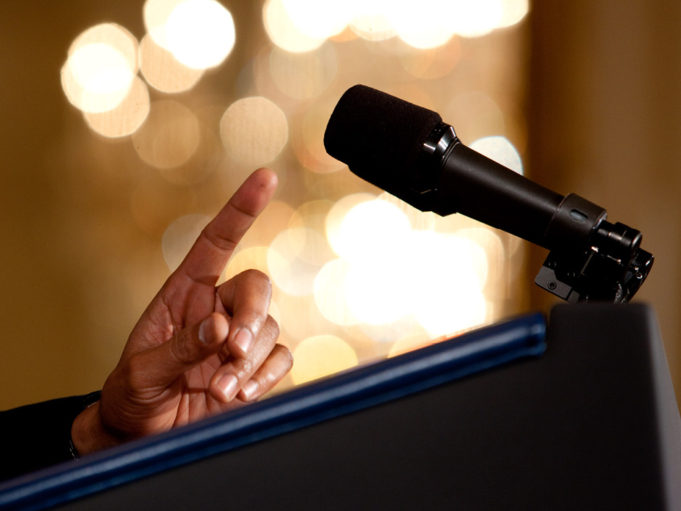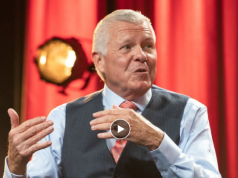When a Missouri girls’ high school basketball coach publically said negative things about the officiating after his team’s playoff loss last season, athletic administrators there pondered a simple question: Can coaches really openly criticize officials without repercussion? When they realized he could and there was no policy to handle such negative comments, they went to work.
Now they want to send their own message: If you criticize officials via the media, whether it’s in the newspaper or social media (Facebook and Twitter), there will be a price to pay.
What Mark Spigarelli, Blue Springs High School girls’ basketball coach, said in an article posted on Examiner.net in Independence, Mo., was this: “I know we’re not supposed to break our cardinal rule, but if the game’s officiated that way and they let 6-foot-4 girls go over our back, there’s not a whole lot we can do. I just thought it was a very poorly officiated game.”
Some states, such as Colorado, have had longstanding policies to protect high school officials from public criticism, but in today’s world of instant communication, all state athletic associations — if they haven’t already — are beginning to realize a frustrated coach or player can inflict much harm in a matter of seconds and one 140-character tweet.
“We’re dealing with officials, who for most of them is not their full-time occupation,” said Tim Thompson, assistant executive director of the Missouri State High School Activities Association (MSHSAA). “We need officials, and we want to try to protect them.”
Prompted by the basketball coach’s criticism, Thompson said that when Missouri’s officials advisory committee met at the end of March, it made a recommendation to the board (MSHSAA) that a policy be established regarding postgame interviews.
Joe Tonelli, who is the director of the Connecticut Interscholastic Athletic Conference (CIAC) Officials Association, agreed that officials need protection. “One of the major tenets of sportsmanship is to show respect for the game officials,” he said. “Criticizing officials in a public forum is contrary to the NFHS coaches’ code of ethics and sends the wrong message to athletes and team followers who take their lead from the coach.
“When coaches cross that line, they need to be held accountable with reasonable consequences. A policy of this nature definitely serves as a deterrent and clearly demonstrates state association support of the game officials.”
The Connecticut policy doesn’t address players who might be critical in interviews or may rant via social media. “Our current policy does not include the student-athletes and it has not been much of an issue for us,” Tonelli said. “We would refer breaches by students to the athletic and school administration. Ironically, we did have an athlete after a recent tournament game go on Twitter and make some very inappropriate comments about the umpiring and our organization. After we referred the matter to the school, the individual was suspended from school. The student also sent a very sincere letter of apology so it turned out to be a teaching moment.”
Coaches have been more of an issue. And it’s not that high school coaches can’t criticize officials — it’s just that they must do so in the proper channels. And a newspaper account, Facebook page or Twitter feed aren’t the proper channels, according to athletic administrators.
“We know that officials make mistakes, and when they do, 99 percent of officials that I talk to when there’s a problem or issue admit, ‘Yes, I kinda lost it,’ or, ‘I shouldn’t have done that,’ or, ‘Yes, I blew the call,’” explained Angela Passafiume, assistant commissioner of the Kentucky High School Athletic Association (KHSAA). “They know what they did well or not so well. “Any good officials are constantly evaluating themselves. I think we have a pretty good understanding at the state office that not all our officials are perfect, not all the kids are perfect and not all our coaches are perfect, and that’s OK. Especially for the kids, that’s part of what high school is all about … to learn and grow.”
There isn’t a clear consensus among state administrators whether public criticism of officials is a growing problem, but there’s no question when a coach does go off on the officiating, in today’s world it’s bound to make news.
“I think there are a lot of things that have brought this to the forefront, and certainly, the number of media-related cases that are on SportsCenter … we see them on local television,” Thompson explained. “(High school coaches) see examples of coaches at higher levels, professional or college level, where they say, ‘I know I’m not supposed to say this, but I’m going to say it anyway.’ And so, that’s what they’re seeing, and in high school athletics, we just don’t have a place for that.”
Of course, coaches and officials have always disagreed, haven’t they? “I think the whole thing about disagreement sometimes between coaches and officials has been going on forever,” said Tom Robinson, assistant commissioner of the Colorado High School Activities Association (CHSAA).
“I think social media may have enhanced it in certain areas, but the frustration that a coach might feel after a contest that the officials cost them a game has been going on for as long as there have been sports.”
STATE LEVEL POLICIES CAN REGULATE COACH COMMUNICATION
Colorado is one state with ground rules to deal with high school coaches who take a verbal or written jab at officials following a contest. In the CHSAA handbook it reads: “If public comments are accurately attributed to the coach, the commissioner may apply any of the penalties listed to the coach and/or program.
“The purpose of the policy is not to restrict the coach from communicating concerns about officiating to the appropriate people, but that it be done in a professional manner which best serves the educational purposes of high school athletics.”
“(Colorado) has had it in the handbook for a long time,” Robinson added. “It was on the books prior to my hiring and that was 12 years ago. I think somebody probably had to deal with a situation here at the CHSAA and in their wisdom, they put something together early on. It obviously doesn’t make any mention of Facebook or Twitter so that’s something we’ll need to update.”
Kentucky is another state with a policy in place. But a high-profile incident a few seasons ago that subsequently appeared in USA Today put a spotlight on that state’s coach-official relationship. Jeff Morrow, Jeffersontown (Louisville-area) boys’ basketball coach, whose team had been ranked in USA Today’s Super 25 boys’ rankings, made several critical tweets about the officiating following a two-point overtime loss. The winning basket was counted although video replays apparently showed the basket came after the buzzer.
The KHSAA fined the offending coach’s athletic program $1,500. In addition, several actions were taken against the coach by the KHSAA for violating the organization’s sportsmanship bylaw.
“It was the semifinals of the Louisville Invitational Tournament, which is one of our more prestigious tournaments,” Passafiume said. “Within 20 minutes of that tweet, I think several of us had said, ‘Did you see what he put?’
“He (the coach) made a bad decision, and he not only made a bad decision about posting a comment about the game, but also by naming the official. I don’t know whether it was a conscious decision or not, but he knew better.
“There was a substantial repercussion to the coach and the school to make sure that that was not tolerated. If I remember correctly, the discipline part was multiple and the coach needed to apologize and speak about the danger of social media.
“And he did, and he did a great job. I was actually there at a couple of them and he did a really nice job of saying how it was a mistake and he wished he hadn’t done it. And he spoke on the dangers of social media and he did some things to improve himself.”
Passafiume said that players who publicly criticize officials receive a penalty as well. The actions are handled on a case-by-case basis.
Pennsylvania has made a commitment to focus on criticism, too. In the last two years, the Pennsylvania Interscholastic Athletic Association has added language to its code of ethics, saying coaches should not criticize officials through the media.
But one veteran football and basketball official in the York-Harrisburg area, Steve Keller, recalls an incident years ago that shows the idea of coaches criticizing officials through the media is nothing new.
“When I first started, 30-plus years ago, I can remember a basketball official who got ripped by a veteran coach, a very highly thought-of veteran coach, in the newspaper,” said Keller, who has officiated Pennsylvania state championship games in football and basketball. His (official’s) name must have appeared in the article five times. He just got ripped and it was toward the end of the season.
“Here in York, everything is done by school and coaches ratings, and with his name being out there like that and everything being said, the official’s ratings just plummeted the next year, and basically, it pretty much ended his career.”
Keller sees that as an isolated incident. “Over the last 10 or 15 years, I don’t know that I’ve read a whole lot of negative publicity in either sport that I do as far as officials go,” said Keller, who also officiates college football.
Publicly criticizing officials is nothing new, but has the advent of social media exacerbated the problem? “I wouldn’t say it’s to an extreme. I think we just hear about it more,” Passafiume added. “I don’t disagree that it has increased probably from 20 years ago, but I think it’s a societal issue as much as anything else. “I think with social media we can see it and hear about it right away instead of the rumor mill two weeks later.”
PUNITIVE FINES SERVE A PURPOSE IN EXTREME INSTANCES
So how do you curb such behavior? Fines and other discipline await professional and college coaches and players who bash officiating. For instance, in the NBA, Chicago Coach Tom Thibodeau got hit with a $35,000 fine last spring for criticizing officials. Boston’s Doc Rivers was fined $25,000 for his public criticisms of officials after a Celtics’ playoff loss to New York.
On the college level, Baylor women’s basketball coach Kim Mulkey was suspended from her team’s next NCAA tournament game for her criticism of officials in the Bears’ NCAA tournament loss to Louisville this spring. The team was also docked its tournament per diem. According to an account on Dallas Morning News’ website, “Mulkey told reporters at her news conference that ‘I’ll be glad to answer any referee questions you want to ask me because I don’t mind getting fined, so ask me.’ “When the question of officiating was raised, Mulkey said the game was ‘too physical, way too physical,’ cited two specific late-game calls and said that if any of the officials advanced to the next round ‘it will be sad for the game.’”
In Major League Baseball, for example, Tampa Bay pitchers Jeremy Hellickson, Matt Moore and David Price were fined $1,000 each by MLB for violating the league’s policy against using social media to criticize an umpire.
What are “reasonable consequences” for high school coaches who violate policies? Some states, such as Kentucky and Connecticut, can utilize monetary penalties for such coach infractions. In Connecticut, its handbook states: “Any coach who criticizes a game official(s) in a public forum will be subject to the following: First offense — one-game disqualification and the school is fined $250; second offense — two-game disqualification and the school is fined $500; third offense — disqualification for the remainder of the season and the school is fined $750 (the coach will be disqualified for a minimum of five games. If the season ends prior to completing the five-game disqualification, the remaining days will carry over to the next season.)”
“Punitive monetary fines are part of CIAC sanctions for eligibility, recruitment and other CIAC violations so this is not out of the ordinary and standard practice,” Tonelli added. “Because of the excellent support we have received from the school administrators in dealing with coaches who crossed the line, we have had great success in holding coaches accountable in this manner in most cases.”
Tonelli added his state’s policy wasn’t sparked by a single incident. However, officials there were concerned such incidents were on the upswing. “Although public criticism of officials by coaches has not been a major problem in Connecticut, about five years ago we started to see an increase in the number of incidences,” he said. “We wanted to raise the awareness of the inappropriateness of this type of conduct and take a proactive approach to nip it in the bud.
“After discussions with the CIAC Sportsmanship Committee and the CIAC Board of Control, we established our current policy on negative comments in 2010.”
As for Missouri, Thompson said the MSHSAA hopes to have a policy concerning media guidelines in place for the 2013-14 school year. They are researching what other states do and what the NCAA has in place at the college level. He added that while coaches have to be careful with their words, the media has changed as well.
“Sometimes, we might have a student in the media covering a game and he might ask: ‘What about that call?’ or ‘What about the officiating?’” Thompson said. “The media can ask a question that can lead a coach down that path.
“Sometimes, the coaches have that adrenaline running and sometimes things come out before the screening mechanism takes place. We want to try to protect our officials and we have had a policy in our officials’ manual that says officials are not to talk to the media after the game.
“And we certainly don’t want the media to talk to the coach and then talk to the officials to get their version. Of course, the social media phenomenon can work the other way, too. Passafiume said there have been instances in Kentucky where it was the game officials, not coaches, who posted negative comments.
“To be honest, we’ve had issues in the other direction,” she said. “We’ve had officials post things either about coaches or about each other and had some disciplinary action taken.”
So expect state associations to likely continue to fine-tune policies about public criticism of officials. And as Robinson said, it should be a straightforward approach.
“I think what we want our coaches to do and be is to be role models for the student-athletes they coach,” Robinson said. “That should be their primary concern. It’s really about coaches being competitive but also teaching life lessons.
“We don’t want kids to feel like they have built-in excuses if a coach feels like maybe an official made a mistake. We don’t want that to be a common activity, and I think by having this on our books it really makes sure that coaches are paying attention to what’s important.”
What's Your Call? Leave a Comment:
Note: This article is archival in nature. Rules, interpretations, mechanics, philosophies and other information may or may not be correct for the current year.
This article is the copyright of ©Referee Enterprises, Inc., and may not be republished in whole or in part online, in print or in any capacity without expressed written permission from Referee. The article is made available for educational use by individuals.



















